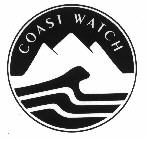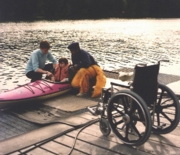 CoastWatch at L.B. Pearson College
CoastWatch at L.B. Pearson College
CONTENTS of this document
1.OVERVIEW
2. OBJECTIVES
3. STRUCTURE OF THE PROGRAM
4. TIME INVOLVED
5 THE CORE
6. SPECIALTY TRAINING
7. SCHOOLS PROGRAM
8. THE COASTWATCH PHOTO GALLERY
9. THE FACULTY
1. OVERVIEW:
In the fall term of 1991, the CoastWatch program at Pearson College was developed from the previously existing marine activity and service programs. As many as 80 students may be involved in this program. Since it’s beginnings, CoastWatch has undergone a number of changes, and today it consists of students of the diving program, the kayaking program and the sailing program. The amount of afternoon and weekend time in the program is determined largely by the level of interest and commitment of the students. Some students participate regularly in the program two afternoons a week, and are able to do aspects of social service and environmental service as well as the training phase of the program. Others do it as an activity once a week. The success of the program depends very much on the initiative of the students involved to help with the organization and instructional aspects.
2. OBJECTIVES:
Students and faculty involved in CoastWatch will have the opportunity to:
1. Learn and put into practice specialized skills to enable them to work safely in the marine environment.
2. Develop attitudes of teamwork in the carrying out of objectives in the marine environment.
3. Enhance their awareness of coastal environmental issues and be involved as part of a marine-based environmental action group.
4. Interact with the local community, both in providing and receiving environmental education opportunities.
5. Interact with the local community for the purposes of providing activity and adventure education.
6. Work with sharing of skills and experiences with members of the disabled community.
3. STRUCTURE OF THE PROGRAM:
The program operates on the basis of several types of training modules. Students work through a core program that give all a common experience, this occurs throughout the two years in the program at the college. Branching off from the core are a number of specialty modules that enable students to develop more detailed skills necessary for the operation of some programs.
4. TIME INVOLVED:
During the first term, first year students in diving are committed for two afternoons per week for the training phase, or for one afternoon in the kayaking or sailing program.
In the second term, first year students have the chance to gain in experience in many of the aspects of the objectives listed above. They may take the opportunity to expand their involvement in the program to be involved with more of the objectives. In the second year, the students will take on a greater role in running the program.
5. THE CORE:
(Theory and Practical : these may take place over the two terms of the first year)
- Shore-front management
- First-Aid at sea
- Small craft handling and safety
- Snorkeling at Sea
- Swimming and life-saving skills
Those who so choose may get into the following aspects as well:
- Coastal Ecology
- Oil spill response
- Beached-bird program
- Education for the outside community at sea
- Working with the physically and mentally challenged
- Coastal Restoration
- Salmonid enhancement
Whereas the Core programs will be done by all CoastWatch students (first and second year), the following will be done by fewer students and at varying times. Hopefully all students by the end of their first year would to be able to contribute by training in their specialties in the second year. The selection of the following could be determined with priority being given to achieving a good balance in the students’ program over a two year period.
6. SPECIALTY TRAINING,
Theory and practical: (students will select a program containing some of the following training components for their first year, depending on when these can be offered.)
- Marine Radio Operator
- Marine Navigator
- Motor Vessel Maintenance
- Motor Vessel Assistant Instructor
- Sail Training Assistant Instructor
- Kayak Training Instructor
- Safety-training Assistant Instructor
- SCUBA diving Assistant Instructor
- Oil-spill response instructor Oiled-Bird Response
- Community coastal clean-up organization
- Ecological Monitoring Module
- Coastal Environmental Issues
- Schools environmental instructor
- Working with the physically and mentally challenged
7. SCHOOLS PROGRAM
In these links are some of the aspects of the Schools Program for the local community. The students of the Diving Activity provide marine education for local elementary schools. 1997-98, and 1999
8. THE COASTWATCH PHOTO GALLERY
9. THE PEARSON COLLEGE FACULTY
- DIVING FACULTY: Michelle Bridgett, Jeff Trapp or Garry Fletcher or Chris Blondeau
- SAILING FACULTY:
Robyn Tyner or Peter Gardner - KAYAKING FACULTY
Richard Van de Lagemaat

